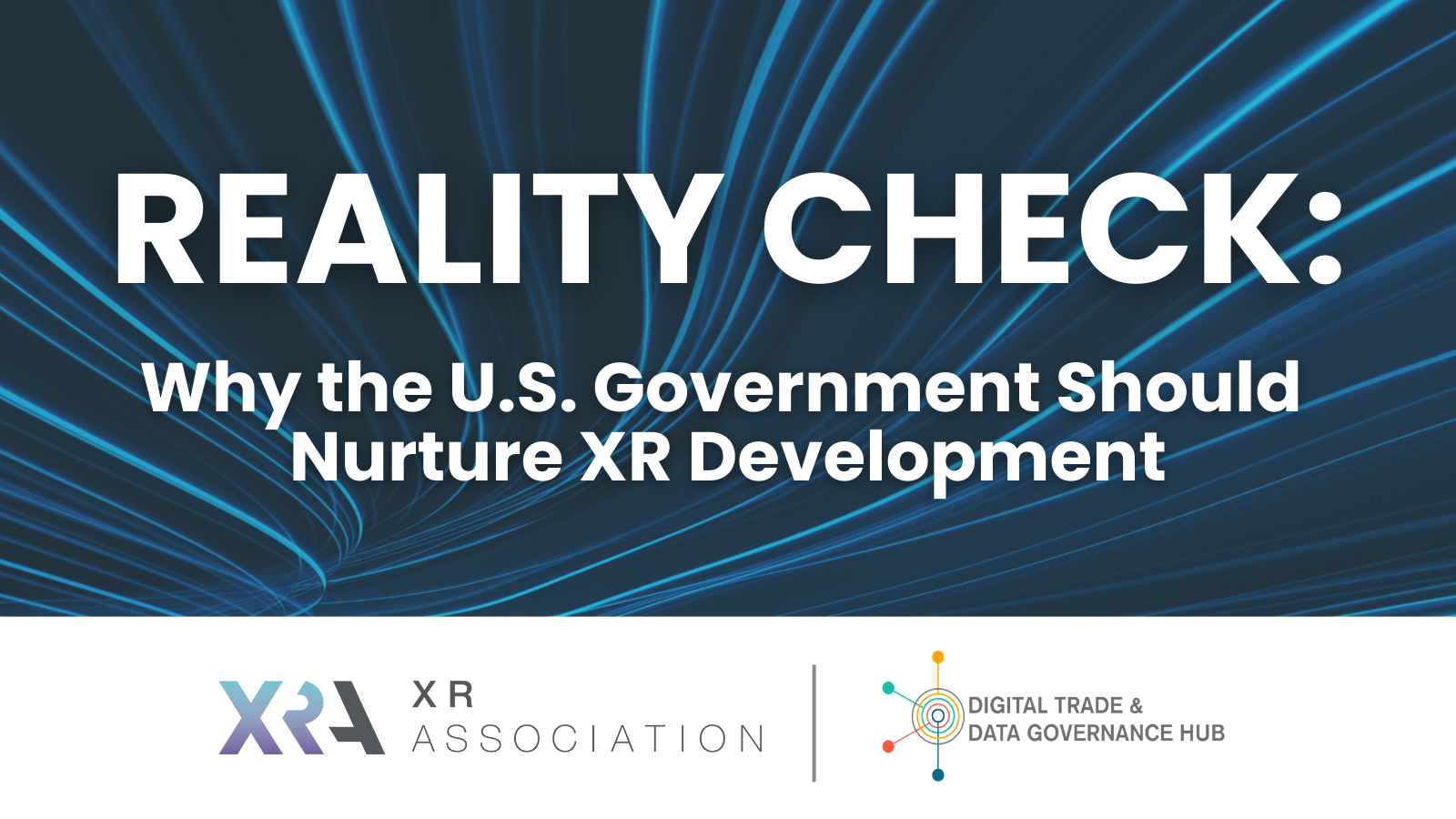Washington, D.C. – On November 8, 2023, the XR Association (XRA), the trade association representing the growing ecosystem of virtual, augmented, and mixed reality companies, announced the release of a white paper co-authored by the Digital Trade and Data Governance Hub at The George Washington University. “Reality Check: Why the U.S. Government Should Nurture XR Development”, compares what China, South Korea, the European Union, the United Kingdom, and the United States are doing to develop and deploy immersive technology (XR).
The paper examines how these governments are creating the enabling environment necessary for XR to flourish by investing in research and innovation, establishing regulatory certainty, and building trust for data-driven technologies like XR. By contrast, the U.S. has not put forward a vision for XR, despite its importance to the economy and national security, and risks falling behind other global competitors.
“XR is a transformative technology that is already driving economic growth and impacting strategic challenges like climate, workforce development, and industrial productivity. The U.S. is the world’s largest market by revenue for immersive technologies and one of the world’s largest producers of XR content and hardware; yet we are behind the curve,” said Joan O’Hara, Senior Vice President of Public Policy at the XR Association. “In 2022, Congress included immersive technology in the CHIPS and Science Act’s list of ‘key technology focus areas,’ and it has been designated a critical technology,” O’Hara went on to say. “Yet, despite its immense benefits to the public and private sectors, the United States has not developed a strategy or institutional structure for nurturing the XR industry.”
As the paper details, China and South Korea have developed national strategies for XR and the metaverse, investing billions of dollars into research and development. Key XR components are also a part of Beijing’s Made in China 2025 strategy and essential to South Korea’s comprehensive Digital New Deal strategy. Meanwhile, in Europe and the UK, policymakers have set out a strategic vision for XR through initiatives on Web 4.0 and virtual worlds and a national Cyber-Physical Infrastructure, respectively.
“Other countries see XR dominance as their chance to shape the future of computing and bolster their economic influence – and they are actively pursuing that end,” noted Miranda Lutz, Director of Public Policy at the XR Association. “Our objective in writing this paper is to provide an unvarnished look at the current state of play around XR, and encourage U.S. policymakers to position the U.S. as a world leader in immersive tech. We hope it will be an eye-opener. In a world where geopolitical power is increasingly linked to technological advancement, the United States government should nurture XR development in a strategic and systemic way. If it fails to do so, other nations may step in to lead the world in the development, adoption, and governance of a technology that is poised to transform the way we live, work, communicate, and deliver essential human services,” said Lutz.
“XR is an incredibly complex yet useful technology. One type of XR, digital twins, can help individuals, organizations, and governments plan for and mitigate wicked problems that transcend generations and borders,” said Susan Aaronson, “Reality Check” co-author, and Research Professor of International Affairs and Cross-Disciplinary Fellow at GWU’s Elliott School. “The components, infrastructures, and technologies that underpin XR illuminate the power of innovation, but they also present policy and societal dilemmas. The U.S. has an opportunity to foster this important technology with a thoughtful strategy, investments in infrastructure, and a focus on flexible, accountant, and participatory governance. Our report illuminates what other governments are doing and what the U.S. Government should do.”
“The idea that virtual reality is only for gaming is no longer valid. Governments around the world now recognize the transformative potential of immersive technologies across industries and applications,” said Adam Zable, “Reality Check” co-author, and Director of Emerging Technology at the Digital Trade and Data Governance Hub. “Moreover, they are working proactively to propel the growth of their domestic industries, aiming not just to shape the trajectory of technology but also to secure a leading position in what they consider one of the most pivotal economic frontiers. Policymakers are implementing bold, systemic visions and orchestrating comprehensive strategies for development and governance. This research is a call for U.S. policymakers to recognize the seriousness with which their counterparts take the promotion and governance of extended reality and related technologies.”
Specifically, “Reality Check” recommends:
- Congress should introduce legislation authorizing an advisory council to develop a strategy to nurture XR in the United States.
- Congress should empower U.S. government agencies to model how the government can leverage digital twins to serve the public interest.
- Congress should pass a comprehensive federal data protection law.
- The White House should establish structures to coordinate, enhance, and fund federal XR research and development.
- The Department of State should host a global summit to foster debate and cooperation around complementary regulatory and governance frameworks and ensure that XR technology reflects democratic values.
For the full report and its takeaways, download today.

ABOUT THE XR ASSOCIATION
The XR Association promotes the dynamic global growth of the XR industry, which includes virtual reality, augmented reality, mixed-reality, and future immersive technology. XRA is leading the way for the responsible development and adoption of XR by convening stakeholders, developing best practices and research, and advocating on behalf of our members and the greater XR industry.
Association members represent the headset and technology manufacturers across the broad XR industry, including Google, HTC Vive, Meta and Oculus, Microsoft, and Sony Interactive Entertainment.





